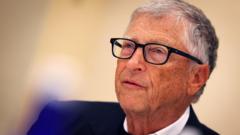South African President Cyril Ramaphosa aims to attract Elon Musk's investment but faces pushback over ownership laws that Musk finds discriminatory. A government official proposes new regulations to ease Starlink's entry, sparking political debate.
South Africa’s Push for Starlink Faces Controversy Over Ownership Rules

South Africa’s Push for Starlink Faces Controversy Over Ownership Rules
Elon Musk's Starlink service encounters hurdles in South Africa due to Black ownership requirements, prompting governmental proposals for alternative frameworks.
South Africa’s president, Cyril Ramaphosa, has expressed a keen interest in encouraging Elon Musk to invest his wealth back into his native country. However, efforts have faced backlash due to Musk’s assertion that the South African government’s stance on Black ownership is discriminatory. The current policy mandates that foreign companies must sell portions of their equity to Black individuals or communities affected by apartheid, a condition which Musk argues hinders Starlink’s operations in South Africa.
To address these challenges, telecommunications official Solly Malatsi is drafting a directive that would allow satellite internet providers like Starlink to operate by investing in disadvantaged communities instead of conforming to equity-sharing laws. This proposal will go through a public consultation with the Independent Communications Authority of South Africa, which oversees the telecommunications sector.
Political opponents of Malatsi argue that creating an alternative to the Black ownership requirement would detract from efforts aiming to rectify racial inequalities rooted in apartheid. They accuse Malatsi of attempting to placate Musk, who has lived outside the country since his teenage years yet remains a prominent figure in globally recognized business. Advocates for the proposal see it as necessary for fostering investment and technological growth in South Africa.

















